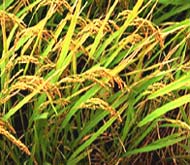 Chinese and German agricultural experts have proved that rice can actually be planted on dry fields, despite the fact that it is usually grown using large amounts of water and nitrogen fertilizer.
Chinese and German agricultural experts have proved that rice can actually be planted on dry fields, despite the fact that it is usually grown using large amounts of water and nitrogen fertilizer.
A new way of growing rice has been developed that could save China water and help protect the environment.
"The previous two years' experiment has indicated that we can save 40-60 percent of water compared with using traditional practices," said Burkhard Sattelmacher, a leading agricultural professor based at the University of Kiel. "We will continue our endeavors to obtain accurate data on how much water we can save per unit of land."
Since 1998, Sattelmacher and his Chinese colleagues have been working on the alternative approach to rice planting. The project has been jointly sponsored by the National Nature Science Foundation of China and the German Research Society, which have spent 500,000 yuan (US$60,000) and 3.5 million yuan (US$421,000) respectively on the programme.
Lin Shan, associate professor of the Beijing-based China Agricultural University, and one of Sattelmacher's former students, instructed his students to grow rice on dry land with soil covered with a plastic film.
"We use the cover to reduce evaporation, increase the temperature of the soil and speed up the growth of plants," said Lin, adding that he had also used paper and plant mulch as a covering, but found that plastic film was more suitable.
"The investment is affordable. For every acre (0.4 hectare) of rice we spent just 40 yuan (US$4.8) on the covering," Lin said.
Apart from water saving, the new technique will help decrease emissions of methane and other nitrogenous gases, which are main contributors to global warming.
As to yield, it is not so important as long as the fields can produce about the same output compared to using traditional methods, according to Sattelmacher.
He said the same experiment carried out in east China's Nanjing and south China's Guangzhou led to slightly reduced or equivalent yields compared with rice planted in the conventional way nearby. In some cases, even higher yields were obtained.
"Water shortages are a big problem for China and thereby we should jointly find solutions," Sattelmacher said. "I love China and I've contributed a lot of energy to the research of rice and tea planting, and educating Chinese agricultural experts."
Jens-Egon Mosch, chairman of the newly-established Beijing-based China and German Centre for Science Promotion, suggested that an agricultural economist needs to properly evaluate the new technique.
"I think the approach needs further evaluation before extensive application," said Mosch, whose centre has jointly launched over 50 research projects with China since it was set up last October.
(China Daily 06/05/2001)
